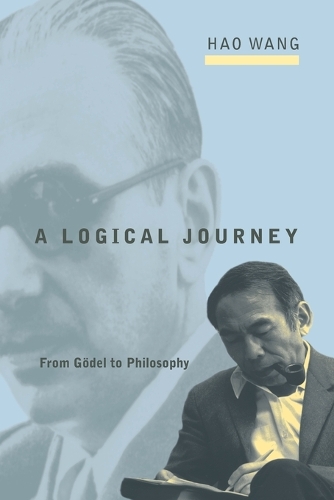
A Logical Journey: From Gdel to Philosophy
(Paperback)
Publishing Details
A Logical Journey: From Gdel to Philosophy
By (Author) Hao Wang
MIT Press Ltd
Bradford Books
25th March 2016
United States
Classifications
Tertiary Education
Non Fiction
160
Physical Properties
Paperback
408
Width 152mm, Height 229mm, Spine 21mm
Description
Hao Wang (1921-1995) was one of the few confidants of the great mathematician and logician Kurt G del. A Logical Journey is a continuation of Wang's Reflections on G del and also elaborates on discussions contained in From Mathematics to Philosophy. A decade in preparation, it contains important and unfamiliar insights into G del's views on a wide range of issues, from Platonism and the nature of logic, to minds and machines, the existence of God, and positivism and phenomenology.The impact of G del's theorem on twentieth-century thought is on par with that of Einstein's theory of relativity, Heisenberg's uncertainty principle, or Keynesian economics. These previously unpublished intimate and informal conversations, however, bring to light and amplify G del's other major contributions to logic and philosophy. They reveal that there is much more in G del's philosophy of mathematics than is commonly believed, and more in his philosophy than his philosophy of mathematics. Wang writes that "it is even possible that his quite informal and loosely structured conversations with me, which I am freely using in this book, will turn out to be the fullest existing expression of the diverse components of his inadequately articulated general philosophy." The first two chapters are devoted to G del's life and mental development. In the chapters that follow, Wang illustrates the quest for overarching solutions and grand unifications of knowledge and action in G del's written speculations on God and an afterlife. He gives the background and a chronological summary of the conversations, considers G del's comments on philosophies and philosophers (his support of Husserl's phenomenology and his digressions on Kant and Wittgenstein), and his attempt to demonstrate the superiority of the mind's power over brains and machines. Three chapters are tied together by what Wang perceives to be G del's governing ideal of philosophy- an exact theory in which mathematics and Newtonian physics serve as a model for philosophy or metaphysics. Finally, in an epilog Wang sketches his own approach to philosophy in contrast to his interpretation of G del's outlook. Hao Wang (1921-1995) was one of the few confidants of the great mathematician and logician Kurt G del. A Logical Journey is a continuation of Wang's Reflections on G del and also elaborates on discussions contained in From Mathematics to Philosophy. A decade in preparation, it contains important and unfamiliar insights into G del's views on a wide range of issues, from Platonism and the nature of logic, to minds and machines, the existence of God, and positivism and phenomenology.The impact of G del's theorem on twentieth-century thought is on par with that of Einstein's theory of relativity, Heisenberg's uncertainty principle, or Keynesian economics. These previously unpublished intimate and informal conversations, however, bring to light and amplify G del's other major contributions to logic and philosophy. They reveal that there is much more in G del's philosophy of mathematics than is commonly believed, and more in his philosophy than his philosophy of mathematics. Wang writes that "it is even possible that his quite informal and loosely structured conversations with me, which I am freely using in this book, will turn out to be the fullest existing expression of the diverse components of his inadequately articulated general philosophy." The first two chapters are devoted to G del's life and mental development. In the chapters that follow, Wang illustrates the quest for overarching solutions and grand unifications of knowledge and action in G del's written speculations on God and an afterlife. He gives the background and a chronological summary of the conversations, considers G del's comments on philosophies and philosophers (his support of Husserl's phenomenology and his digressions on Kant and Wittgenstein), and his attempt to demonstrate the superiority of the mind's power over brains and machines. Three chapters are tied together by what Wang perceives to be G del's governing ideal of philosophy- an exact theory in which mathematics and Newtonian physics serve as a model for philosophy or metaphysics. Finally, in an epilog Wang sketches his own approach to philosophy in contrast to his interpretation of G del's outlook.
Author Bio
Hao Wang is Professor of Logic at The Rockefeller University and author of scores of articles and several books on logic, computers, and philosophy, including From Mathematics to Philosophy (extensively discussed with G del and containing contributions by him) and Beyond Analytic Philosophy- Doing Justice to What We Know (MIT Press Bradford Books). He is currently preparing a companion volume, Conversations with Kurt G del which will concentrate on G del's unpublished ideas.
